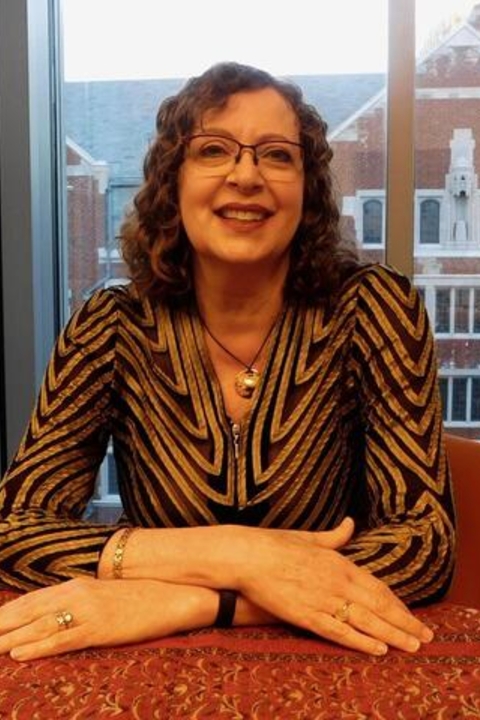Professor Inhorn is the William K. Lanman, Jr. Professor of Anthropology and International Affairs and Chair of the Council on Middle East Studies (CMES) in The Whitney and Betty MacMillan Center for International and Area Studies.
As a medical anthropologist, Inhorn’s research interests revolve around gender and health, science and technology studies (STS), feminist theory (including masculinity studies), religion and bioethics, globalization and global health, cultures of biomedicine and ethnomedicine, stigma and human suffering, and the health costs of conflict, especially for refugees and forced migrants.
Inhorn is the author of seven books and the (co)editor of thirteen. Her newest book, Motherhood on Ice: The Mating Gap and Why Women Freeze Their Eggs (NYU Press, 2023)draws on the stories of more than 150 women who pursued this fertility preservation technology. Contrary to popular belief, egg freezing is rarely about women postponing fertility for the sake of their careers. Rather, the most-educated women are increasingly forced to delay childbearing because they face a mating gap—a lack of eligible, educated, equal partners ready for marriage and parenthood. For these women, egg freezing is a reproductive backstop, a technological attempt to bridge the gap while waiting for the right partner. But it is not an easy choice for most. Their stories reveal the extent to which it is logistically complicated, physically taxing, financially demanding, emotionally draining, and uncertain in its effects. Moving between narratives of pain and empowerment, Motherhood on Ice reveals the complexity of women’s lives as they struggle to preserve and extend their fertility.
Inhorn is also a Modern Middle East Studies scholar, who has undertaken in-depth ethnographic research on reproductive health and assisted reproductive technologies in three Middle Eastern countries, as well as in Arab America. She is the author of six books on the subject, including America’s Arab Refugees: Vulnerability and Health on the Margins (Stanford U Press, 2018); Cosmopolitan Conceptions: IVF Sojourns in Global Dubai, (Duke U Press, 2015); The New Arab Man: Emergent Masculinities, Technologies, and Islam in the Middle East (Princeton U Press, 2012), Local Babies, Global Science: Gender, Religion, and In Vitro Fertilization in Egypt (Routledge, 2003); Infertility and Patriarchy: The Cultural Politics of Gender and Family Life in Egypt (U Pennsylvania Press, 1996) and Quest for Conception: Gender, Infertility, and Egyptian Medical Traditions (U Pennsylvania Press, 1994). The books have won multiple awards, including the American Anthropological Association’s Robert B. Textor and Family Prize for Excellence in Anticipatory Anthropology, the Eileen Basker Prize of the Society for Medical Anthropology, and the Diana Forsythe Prize for outstanding feminist anthropological research in the areas of gender, health, science, technology, and biomedicine.
Inhorn is also the primary editor or co-editor of thirteen volumes, including Arab Masculinities: Anthropological Reconceptions (Indiana U Press, 2022); Un-Settling Middle Eastern Refugees: Regimes of Exclusion and Inclusion in the Middle East, Europe, and North America (Berghahn, 2021); Waithood: Gender, Education, and Global Delays in Marriage and Childbearing (Berghahn, 2021); Reconceiving Muslim Men: Love and Marriage, Family and Care in Precarious Times (Berghahn Books, 2018); Globalized Fatherhood (Berghahn Books, 2014); Medical Anthropology at the Intersections: Histories, Activisms, and Futures (Duke U Press, 2012); Islam and Assisted Reproductive Technologies: Sunni and Shia Perspectives (Berghahn Books, 2012); Anthropology and Public Health: Bridging Differences in Culture and Society (Oxford U Press, 2009); Reconceiving the Second Sex: Men, Masculinity, and Reproduction (Berghahn Books, 2009); Reproductive Disruptions: Gender, Technology, and Biopolitics in the New Millennium (Berghahn Books, 2007); and Infertility around the Globe: New Thinking on Childlessness, Gender, and Reproductive Technologies (U California Press, 2002).
Inhorn has been a visiting professor at the American University of Beirut, Lebanon; the American University of Sharjah, United Arab Emirates; University of Cambridge, United Kingdom; and Monash University, Australia. She also served as Head of Studies for Anthropology at Yale-NUS College in Singapore. From 2018-2022, she co-directed the Wellcome Trust project on “Changing (In)Fertilities” with Prof. Sarah Franklin of the University of Cambridge.
Inhorn is the founding editor of JMEWS (Journal of Middle East Women’s Studies), the professional journal of the Association of Middle East Women’s Studies (Middle East Studies Association); former co-editor-in-chief of Reproductive BioMedicine and Society Online; associate editor of Global Public Health; and co-editor for the Berghahn Book series on “Fertility, Sexuality, and Reproduction.”
As Past-President of the Society for Medical Anthropology (SMA) of the American Anthropological Association, Inhorn hosted the first international SMA conference on “Medical Anthropology at the Intersections: Celebrating 50 Years of Interdisciplinarity,” which was held at Yale University. She has also received the SMA’s Medical Anthropology Student Association (MASA) Graduate Student Mentor Award.
Inhorn comes to Yale from the University of Michigan (2001-2008). She has also taught at Emory University (1994-2000) and the University of Arizona (1991-1994). She is the wife of Kirk Hooks and mother of Carl (27) and Justine Hooks (24). Inhorn is also a cellist.
